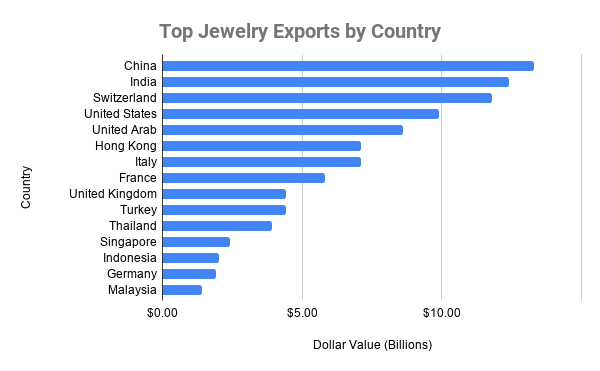How Much Money Do Jewelers Make

The allure of shimmering gemstones and precious metals often overshadows the more pragmatic question: How much do jewelers actually earn? The answer, as with many professions, is complex and varies widely depending on experience, location, specialization, and business ownership.
This article delves into the diverse income landscape of jewelers, exploring the factors that influence their earning potential and providing insights into the financial realities of working in this multifaceted industry. Understanding these nuances is crucial for aspiring jewelers considering a career path, as well as for customers seeking to appreciate the expertise behind the pieces they admire.
The Spectrum of Jewelry Careers
The term "jeweler" encompasses a wide range of roles, each with its own skill set and earning potential. From bench jewelers meticulously crafting intricate designs to sales associates guiding customers through selections, the industry offers diverse avenues for employment.
The Bureau of Labor Statistics (BLS) provides some general data, though it often lumps jewelers and precious stone and metal workers together. This aggregate data offers a starting point but doesn't fully capture the nuances within the profession.
Bench Jewelers and Goldsmiths
Bench jewelers, also known as goldsmiths or silversmiths, are the artisans who create, repair, and modify jewelry. Their income is often determined by their skill level, experience, and the demand for their specific expertise.
Entry-level bench jewelers typically earn less, gaining experience and honing their skills through apprenticeships or formal training. Experienced jewelers, particularly those specializing in custom designs or intricate repairs, can command higher salaries.
Retail Sales Associates
Jewelry sales associates play a crucial role in connecting customers with the perfect piece. Their income often consists of a base salary plus commission, rewarding them for sales performance.
Earnings for sales associates can vary significantly based on factors like the store's location, clientele, and the associate's sales skills. Luxury jewelry stores typically offer higher earning potential compared to mass-market retailers.
Jewelry Designers
Jewelry designers are the creative minds behind the collections we see in stores. Their income can range from modest to substantial, depending on their reputation, brand recognition, and the success of their designs.
Many designers start by working for established jewelry companies before venturing out to create their own brands. Establishing a successful design business requires not only artistic talent but also strong business acumen.
Appraisers and Gemologists
Appraisers and gemologists possess specialized knowledge of gemstones and jewelry valuation. Their expertise is crucial for insurance purposes, estate settlements, and buying/selling decisions.
Certification from organizations like the Gemological Institute of America (GIA) can significantly enhance their credibility and earning potential. They are often self-employed or work for jewelry stores, auction houses, or appraisal firms.
Factors Influencing Income
Several factors significantly impact a jeweler's income. Location, experience, specialization, education, and business ownership all play a role.
Geographic location matters, as jewelers in affluent areas or major cities often earn more due to higher demand and cost of living. Experience is also a key determinant, with seasoned professionals commanding higher wages for their expertise.
Specialization can also increase earning potential, whether it's expertise in diamond grading, antique jewelry restoration, or CAD/CAM design. Formal education and certifications, such as those offered by the GIA, often lead to higher earning potential.
The Business Owner's Perspective
Jewelers who own their own businesses face a different financial landscape. Their income is directly tied to the success of their business, encompassing both profits and losses.
While the potential for higher earnings exists, business owners also bear the responsibility of managing expenses, marketing, and customer service. The initial investment required to start a jewelry business can also be substantial.
Starting a jewelry business requires careful planning and a strong understanding of the market. Success depends on factors like location, product selection, pricing strategy, and customer relations.
Data and Statistics
The BLS data, while broad, offers some insight. As of May 2022, the median annual wage for jewelers and precious stone and metal workers was $47,590. However, the range varied widely, with the lowest 10 percent earning less than $30,000 and the highest 10 percent earning more than $79,000.
It's important to remember that these figures are averages and don't account for self-employed jewelers or those working on commission. Industry surveys and reports from organizations like Jewelers of America can provide more specific data.
Keep in mind that data can be outdated quickly. Always check the latest data available from credible sources.
A Look at the Future
The jewelry industry is constantly evolving, with trends like lab-grown diamonds and online retail shaping the market. Jewelers who adapt to these changes and embrace new technologies will be best positioned for success.
The demand for skilled bench jewelers is expected to remain strong, particularly for those who can perform intricate repairs and custom designs. Strong customer service skills and a deep understanding of jewelry trends will be crucial for retail sales associates.
The future of the jewelry industry depends on innovation and adaptability. Jewelers who are willing to learn and embrace new technologies will be best positioned to thrive in this dynamic market.
Conclusion
The income of a jeweler is a multifaceted issue influenced by numerous factors. From the skilled artisan crafting intricate designs to the savvy sales associate connecting customers with the perfect piece, the profession offers diverse opportunities with varying financial rewards.
While the average salary provides a general benchmark, individual earnings can vary significantly based on experience, location, specialization, and business ownership. Aspiring jewelers should carefully consider these factors when charting their career path.
Ultimately, success in the jewelry industry requires not only technical skills and creative talent but also a strong work ethic, a passion for the craft, and a commitment to providing exceptional customer service. Hard work and commitment are keys to success.











![How Much Money Do Jewelers Make How Much Does A 6 Carat Diamond Cost? [July 2025 Prices] - Diamond Masters](https://www.dmia.net/wp-content/uploads/Do-Jewelers-Buy-Used-Diamond-Rings.jpg)






